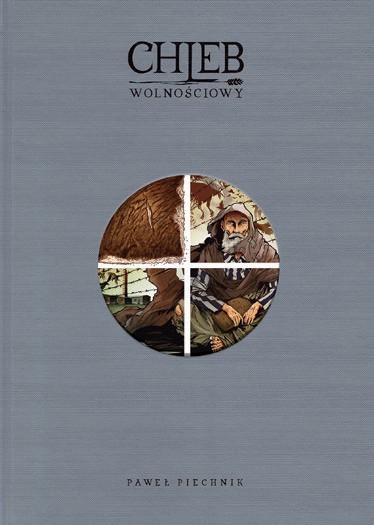An innovative narrative approach to the stories of prisoners in a Nazi German concentration camp

An innovative narrative approach to the stories of prisoners in a Nazi German concentration camp

Translation rights: Państwowe Muzeum na Majdanku, d.niedzialkowska@majdanek.eu
The Bread of Freedom is an undiluted look at one of the most tragic chapters in the history of the Second World War. Paweł Piechnik’s graphic novel takes an artistic view of history, taking an innovative narrative approach to the stories of prisoners in the Nazi German concentration camp in Lublin, commonly known as Majdanek.
Piechnik’s story is made up of short testimonies from people of different ethnic backgrounds who managed to survive the hell of the camp. These episodes are arranged into three thematic sections: On Hunger, On Death and On Freedom. This division allows us to see the most essential elements of life in the concentration camp in a small number of pages. Inhumane treatment of prisoners was the rule in Majdanek, where the titular bread baked outside the walls of the camp, unavailable to the prisoners, was a synonym for the freedom that they had been stripped of.
Paweł Piechnik does not shy away from graphic imagery in his panels, yet at the same time he imbues his story with a universal dimension that is full of hope. This graphic novel begins with a stylised prologue about a story of danger, and Piechnik maintains the sombre mood for an extended period, only to finally strike out in a new direction with the chapter On Freedom, which shows how the prisoners fought against this merciless system.
The Bread of Freedom ends with images whose brighter colours link the painful past to our present, and metaphorically free the souls of those who did not survive this German death factory. But thanks to those who did, we can pore over this graphic novel’s short, ostensibly mundane, eyewitness testimonies whose significance is nonetheless disturbing. These are words and images that we ourselves would never want to experience, but which we have no right to ever forget.
Tomasz Miecznikowski
Translated by Sean Gasper Bye
Selected samples
She climbed her first peaks in a headscarf at a time when women in the mountains were treated by climbers as an additional backpack. It was with her that female alpinism began! She gained recognition in a spectacular way. The path was considered a crossing for madmen. Especially since the tragic accident in 1929, preserved … Continue reading “Halina”
First, Marysia, a student of an exclusive private school in Warsaw’s Mokotów district, dies under the wheels of a train. Her teacher, Elżbieta, tries to find out what really happened. She starts a private investigation only soon to perish herself. But her body disappears, and the only people who have seen anything are Gniewomir, a … Continue reading “Wound”
A young girl, Regina Wieczorek, was found dead on the beach. She was nineteen years old and had no enemies. Fortunately, the culprit was quickly found. At least, that’s what the militia think. Meanwhile, one day in November, Jan Kowalski appears at the police station. He claims to have killed not only Regina but also … Continue reading “Penance”
The year is 1922. A dangerous time of breakthrough. In the Eastern Borderlands of the Republic of Poland, Bolshevik gangs sow terror, leaving behind the corpses of men and disgraced women. A ruthless secret intelligence race takes place between the Lviv-Warsaw-Free City of Gdańsk line. Lviv investigator Edward Popielski, called Łysy (“Hairless”), receives an offer … Continue reading “A Girl with Four Fingers”
This question is closely related to the next one, namely: if any goal exists, does life lead us to that goal in an orderly manner? In other words, is everything that happens to us just a set of chaotic events that, combined together, do not form a whole? To understand how the concept of providence … Continue reading “Order and Love”
The work of Józef Łobodowski (1909-1988) – a remarkable poet, prose writer, and translator, who spent most of his life in exile – is slowly being revived in Poland. Łobodowski’s brilliant three- volume novel, composed on an epic scale, concerns the fate of families and orphans unmoored by the Bolshevik Revolution and civil war and … Continue reading “Ukrainian Trilogy: Thickets, The Settlement, The Way Back”























































































































































































































































































